 THE MINERAL CHALCOPYRITE
THE MINERAL CHALCOPYRITE
- Chemistry: CuFeS2, Copper Iron Sulfide
- Class: Sulfides
- Group:
Chalcopyrite - Uses: Major ore of copper
Specimens
As an ore od copper, the yield of chalcopyrite is rather low in terms of atoms per molecule. It is only 25%, compared to other copper minerals such as chalcocite, Cu2S - 67%; cuprite, Cu2O - 67%; covellite, CuS - 50% or bornite Cu5FeS4 - 50%. However the large quantities and widespread distribution of chalcopyrite make it the leading source of copper. Chalcopyrite is a common mineral and is found in almost all sulfide deposits. Fine crystals of chalcopyrite have a unique character and can add to anyone's collection.
PHYSICAL CHARACTERISTICS:
- Color is brassy yellow, tarnishes to irredescent blues, greens, yellows and purples.
- Luster is metallic.
- Transparency: Crystals are opaque.
- Crystal System is tetragonal; bar 4 2m
- Crystal Habits are predominantly the disphenoid which is like two opposing wedges and resembles a tetrahedron. Crystals sometines twinned. Also commonly massive, and sometimes botryoidal.
- Cleavage is rather poor in one direction.
- Fracture is conchoidal and brittle.
- Hardness is 3.5-4
- Specific Gravity is approximately 4.2 (average for metallic minerals)
- Streak is dark green.
- Other Characteristics: Some striations on most crystal faces.
- Associated Minerals are quartz, fluorite, barite, dolomite, calcite, pentlandite, pyrite and other sulfides.
- Notable Occurances include Chile, Peru, Mexico, Europe, South Africa, several USA sites and many others around the world.
- Best Field Indicators are crystal habit, tarnish, softness and brittleness.
 Amethyst Galleries' Mineral Gallery MINERALS |
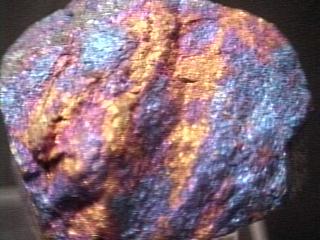
CHALCOPYRITE specimen clp-1
$ 15.00
$ 15.00
Dims: 2-7/8" x 2-1/2" x 1-7/8"
Wt: 1 lb., 1 oz
Zacatecas, Mexico
This extremely colorful mineral specimen is actually a blend of three different minerals, including Chalcopyrite, Bornite, and Covellite, creating what most collectors know as "Peacock Copper." It is incredibly colorful, with deep blues, purples, yellows, oranges, and reds with a metallic luster. This would make the quintissential paperweight for an ex-hippie, or just a nice gift for a youngster with a budding interest in minerals.

clp-1 ($ 15.00)
Zacatecas, Mexico
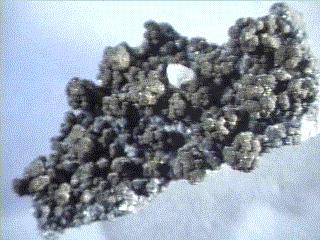
CHALCOPYRITE specimen clp-2
$ 36.00
$ 36.00
Dims: 5-1/4" x 2-3/4" x 2-1/4"
Wt: 1 lb., 4 oz
Reynolds Co., Missouri, U.S.A.
This is a truly fascinating specimen; the minerals are spread along one face of a massive calcite/dolomite host rock. The mineral layer adjacent to the host is composed of scores of pyritohedral and dodecahedral galena crystals, all measuring 3/16 inch or less in diameter. Growing off of many of these galenas are botryoidal clusters of Chalcopyrite. They are a dirty, dull gold color, and each globule is 1/8 inch in diameter or less, with several massing together to make each cluster. Out of all of this formative turbulence rises one lone dogtooth calcite that is almost an inch long, with very minor scoring on its tip, and very good clarity.
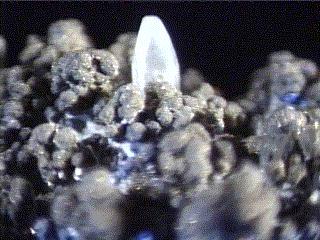

clp-2 ($ 36.00)
Reynolds Co., Missouri, U.S.A.
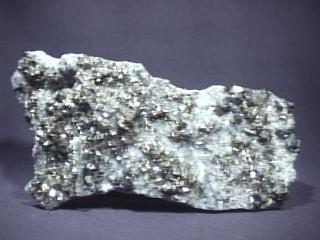
CHALCOPYRITE specimen clp-4
$ 52.00
$ 52.00
Dims: 6.3" x 3.3" x 2.1" (16.0 x 8.4 x 5.3 cm)
Wt: 1 lb., 12.3 oz. (801 g)
Ancash, Peru
One of our larger specimens, this Peruvian piece consists of dozens of Chalcopyrite crystals scattered over a quartz-covered base rock, along with as many pyrites and some sphalerite crystals. The Chalcopyrites have very good form and occur as rounded tetrahedrons with clean faces and edges, and very little damage. They reach maximum size of 0.3" (8 mm) along an edge, and have the obligatory deep golden coloration and metallic luster. The pyrite and sphalerite crystals are similarly sized and also in good condition. They rest on a bed of tiny, transparent quartz crystals that coat a base rock made up of all three sulfide minerals. There are a few small patches of mangano-calcite blades on the edge of the quartz crust. It is a classic Peruvian specimen, with lots of sparkling sulfide material.
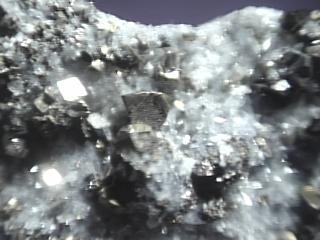

clp-4 ($ 52.00)
Ancash, Peru
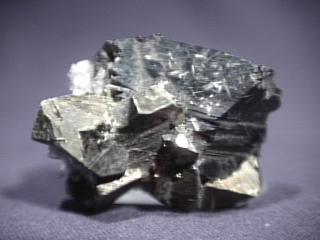
CHALCOPYRITE specimen clp-5
$ 26.00
$ 26.00
Dims: 2.0" x 1.5" x 0.9" (5.1 x 3.8 x 2.3 cm)
Wt: 2.17 oz. (61.6 g)
Ancash, Peru
One of the simpler Chalcopyrite specimens that I have seen, this specimen consists of several oddly-shaped crystals on a very large but incomplete sphalerite crystal. The Chalcopyrites have a warped form but are complete and show only a small amount of damage. They have the deep golden color and metallic luster that is common in crystals of this mineral, and are obviously opaque. The sphalerite crystal on which they rest has the standard brown-black coloration and adamantine luster; it has only one complete face, and shows evidence of twinning. A few transparent, clear quartz crystals rest on one end of the specimen, but there is no other material.

clp-5 ($ 26.00)
Ancash, Peru
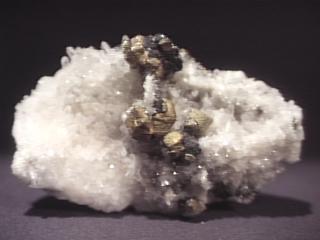
CHALCOPYRITE specimen clp-7
$ 78.00
$ 78.00
Dims: 3.7" x 2.8" x 1.8" (9.4 x 7.1 x 4.6 cm)
Wt: 8.24 oz. (233.7 g)
Huaron Mine, Ancash, Peru
A simple specimen, this piece contains about 10 very beautiful, well-developed Chalcopyrite crystals. These crystals take on the form of twinned disphenoids, and some look very similar to dodecahedrons. The largest of these crystals measures 0.4 x 0.3 x 0.3" (1.0 x 0.8 x 0.8 cm), and like the others, is in excellent condition and free from human-induced damage. All have the characteristic deep golden coloration and metallic luster of Chalcopyrite. All of these crystals are grown on to sphalerite crystals that rest on the quartz base. The sphalerites are small but well-formed, and in one instance seem to be compressed into a larger, "composite crystal". The quartz base on which they rests consists of a crust that is made up of scores of small transparent crystals with excellent form. This specimen has excellent contrast- it's very easy to see the Chalcpyrites against the white background, and as they are all slightly raised off of the quartz druse, they are easy to examine.
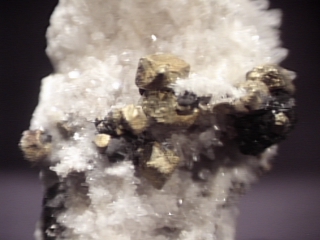

clp-7 ($ 78.00)
Huaron Mine, Ancash, Peru
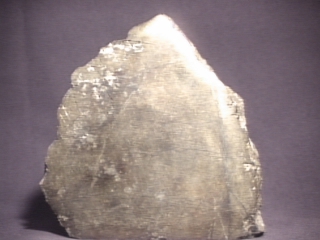
$ 150.00
Dims: 6.4" x 6.2" x 2.4" (16.3 x 15.7 x 6.1 cm)
Wt: 5.9 lbs. (2.7 kg)
unknown
Though cut and partially polished and showing no definite crystal form, this is the largest single piece of Chalcopyrite that I have ever seen. It is extremey large and has a generally flat, triangular shape. A narrow, unpolished face cut into it serves as a base which allows it to stand upright, and the other face is quite large and is somewhat polished, enabling one to see dark veins and nodules in the dull golden material. It has a metallic luster. The rough faces of the piece show some of the red iridescence that is sometimes seen on Chalcopyrite. It is certainly not the type of mineral that I would expect to see displayed in such a way.
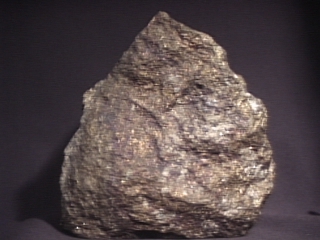

unknown
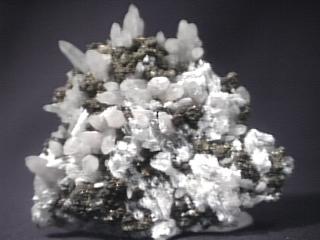
CHALCOPYRITE specimen clp-10
$ 25.00
$ 25.00
Dims: 3.3" x 2.9" x 1.1" (8.4 x 7.4 x 2.8 cm)
Wt: 5.22 oz. (148.3 g)
Huaron Mine, Ancash, Peru
Though not quite as noticeable as the quartz crystals on this specimen, there is a substantial amount of Chalcopyrite visible, more than I have seen on most pieces from the Huaron Mine. The Chalcopyrite is clustered in several places on the flat piece and is in very good condition, though there are a few spots where some noticeable damage has occurred. The clustering and interaction with other minerals on the piece has warped and in some places destroyed the Chalcopyrite's crystal form, but there is evidence in a few places of the tetragonal disphenoidal form that is common in this mineral. It has a deep golden color that has a very green tint to it, and its metallic luster is duller than average. Many colorless, transparent quartz crystals erupt from the flat Chalcopyrite base- all show excellent hexagonal prismatic form and a rather dull, pearly luster. There is also a noticeable amount of white calcite attached to the quartz and Chalcopyrite that has the form of extremely thin blades that have been mostly weathered away.
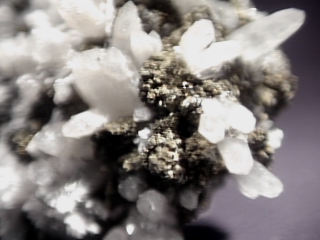

clp-10 ($ 25.00)
Huaron Mine, Ancash, Peru
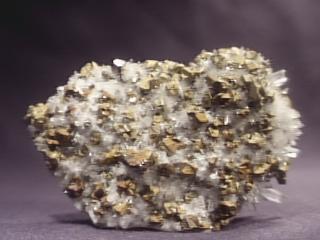
CHALCOPYRITE specimen clp-12
$ 65.00
$ 65.00
Dims: 3.2" x 2.3" x 1.7" (8.1 x 5.8 x 4.3 cm)
Wt: 7.77 oz. (220.3 g)
Huaron Mine, Ancash, Peru
There are scores of small Chalcopyrite crystals amid the quartz crystals on this specimen. They range in diameter from 1 mm or less up to 0.3" (0.8 cm), and have excellent disphenoidal form, though many of them are intergrown. Their color is an unusually deep gold that fades to an almost rusty orange in some areas, and they all have a dull metallic luster. They are accompanied by a few small but well-formed pyrite crystals that are easily discernable due to their pale golden color and much brighter luster. The quartz crystals that pervade the surface have the standard hexagonal prismatic form with six-sided pyramidal terminations. They are transparent, clear, and have an unusually dull, pearly-to-waxy luster. Their lengths range from about 2 mm to 0.5" (1.3 cm). The intense contrast between the whitish quartz crystals and the deep golden Chalcopyrite made me notice it immediately.
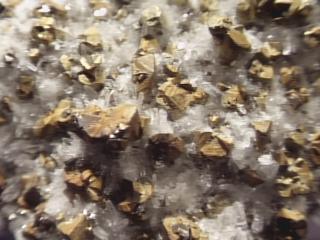

clp-12 ($ 65.00)
Huaron Mine, Ancash, Peru
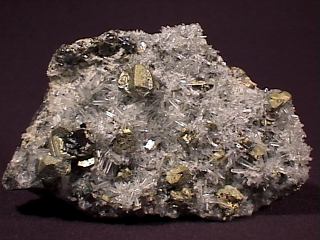
CHALCOPYRITE specimen clp-13
$ 50.00
$ 50.00
Dims: 3.2" x 2.3" x 1.5" (8.1 x 5.8 x 3.8 cm)
Wt: 8.92 oz. (233.1 g)
Huaron Mine, Ancash, Peru
There are several Chalcopyrite crystals resting among the tangle of intergrown quartz prisms on this specimen. They do not exceed 0.4" (1.0 cm) in diameter, and all have reasonably good form. Interestingly, there do not seem to be any single, individual crystals; all those that I can see are intergrown. Most simply intersect neatly with one other crystal. Their golden color is paler than I am used to seeing- it is almost the color of pyrite! However, the crystals have the standard metallic luster of Chalcopyrite that is duller than that of pyrite. There are a few small pyrite cubes scattered among the Chalcopyrite, and a few battered sphalerite crystals. The bed of quartz crystals on which they lay is in good condition, showing few broken crystals. All of the quartzes show excellent hexagonal prismatic form, and are colorless, transparent, and quite clear.
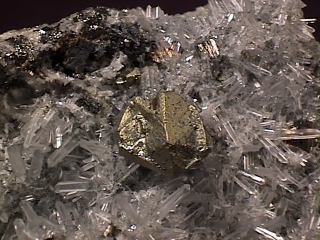

clp-13 ($ 50.00)
Huaron Mine, Ancash, Peru
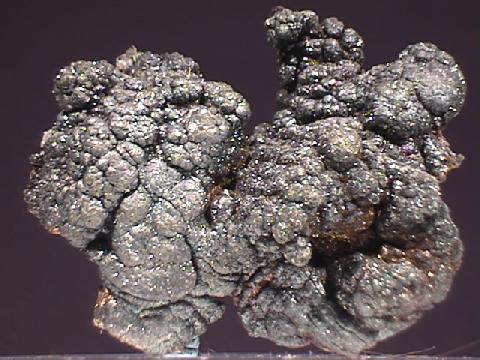
CHALCOPYRITE specimen clp-14
$ 25.00
$ 25.00
Dims: 2.6 x 2.2 x 1.0" (6.6 x 5.6 x 2.5 cm)
Wt: 4.23 oz. (119.9 g)
Reynolds County, Missouri, U.S.A.
I received this specimen with documentation that claimed it was a marcasite specimen, and indeed the reniform formations that comprise it are coated with both massive and crystalline marcaiste. However, upon turning the piece over, I saw that the marcasite makes up only a thin coating over the reniform Chalcopyrite. The specimen is generally in very good condition, showing very little fresh damage. The Chalcopyrite is only visible on the main breakage area that serves as the underside of the specimen, and has the classic deep golden coloration and metallic luster of its species. The marcasite that coats it has an almost blue-green coloration and a slightly duller metallic luster. The crystalline material has good orthorhombic form, though crystals are rounded and somewhat intergrown. The material on which these minerals rest is made up of a gray dolomitic limestone that contains several small, white dolomite crystals, most of which are broken.

clp-14 ($ 25.00)
Reynolds County, Missouri, U.S.A.
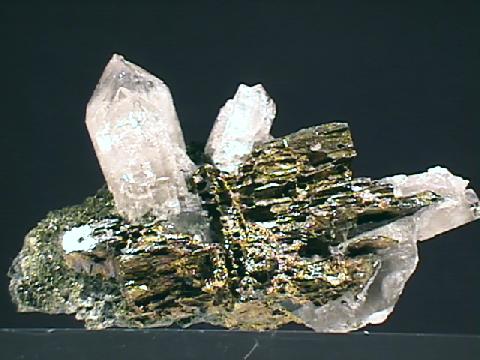
CHALCOPYRITE specimen clp-15
$ 90.00
$ 90.00
Dims: 3.2 x 1.8 x 1.3" (8.1 x 4.6 x 3.3 cm)
Wt: 2.74 oz. (77.8 g)
Santa Catarina, Brazil
This specimen consists of some of the most unusual Chalcopyrite formations that I have ever seen. These formations likely started out as intergrown crystals that rest on the epidote-laden base of this small hand specimen. These crystals likely decayed through some process to create these nearly skeletal formations. There is some crystal form evident, but most of the surfaces are so warped and uneven that finding actual damage is difficult. The Chalcopyrite has the standard deep golden color and metallic luster of its species. It is accompanied by 4 quartz crystals, two of which are heavily damaged and incomplete. The base material seems to be made up primarily of intergrown epidote druses that are made up of many small, thin needle-like crystals.
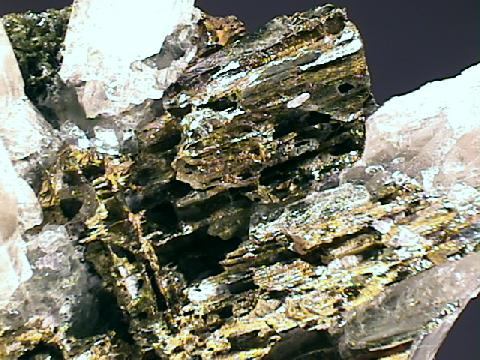

clp-15 ($ 90.00)
Santa Catarina, Brazil
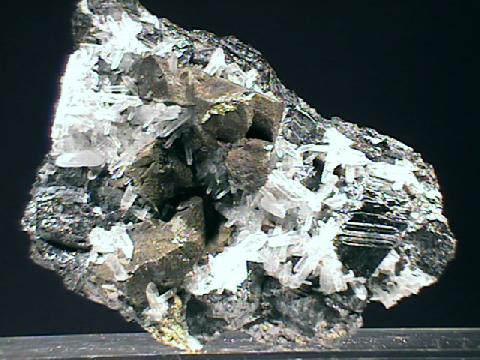
CHALCOPYRITE specimen clp-16
$ 25.00
$ 25.00
Dims: 3.7 x 2.5 x 1.4" (9.4 x 6.4 x 3.6 cm)
Wt: 11.6 oz. (328 g)
Huaron Mine, Ancash, Peru
Several heavily-intergrown Chalcopyrites rest on the sphalerite base of this piece. These crystals are in moderately good condition due to substantial visible damage and do not appear to exceed 0.6" (1.5 cm) in diameter. Due to their intense intergrowth, it is extremely difficult to study their tetragonal form. All appear to be covered with a dark brown, dull coating- only the damaged areas betray their deep golden color and metallic luster. They are accompanied by many small quartz crystals, and the sphalerite base is crystalline but heavily damaged.

clp-16 ($ 25.00)
Huaron Mine, Ancash, Peru
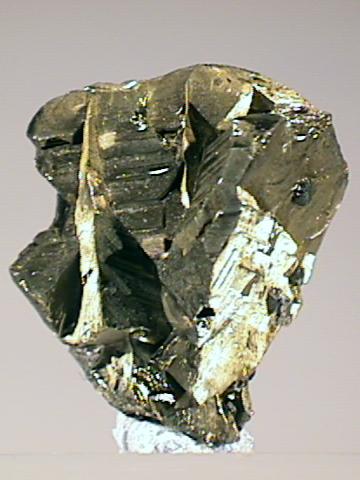
CHALCOPYRITE specimen clp-17
$ 25.00
$ 25.00
Dims: 0.7 x 0.6 x 0.5" (1.9 x 1.6 x 1.3 cm)
Wt: 4.2 g
Bandora Mine, San Juan County, Colorado, U.S.A.
This small thumbnail specimen consists of either a single, warped Chalcopyrite crystal or a group of heavily-intergrown crystals. The piece is in moderately good condition, showing obvious damage to one point, and has a very warped tetragonal form or forms. I am thinking that this piece shows some penetration twinning occurring in this piece, but I am not sure. It has the standard deep-golden color and metallic luster of its species. There is no base or host material present.

clp-17 ($ 25.00)
Bandora Mine, San Juan County, Colorado, U.S.A.
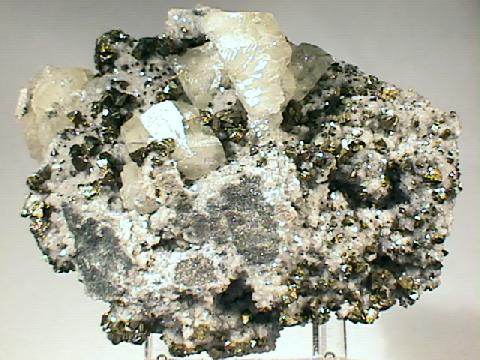
CHALCOPYRITE specimen clp-18
$ 32.00
$ 32.00
Dims: 3.6 x 3.0 x 3.0" (9.2 x 7.7 x 7.5 cm)
Wt: 1 lb., 0.6 oz. (470 g)
Amax Mine, Reynolds County, Missouri, U.S.A.
This small cabinet specimen consists of a chunk of gray dolomitic limestone on which rest at least 150 small Chalcopyrites. These crystals do not generally exceed 0.1" (3 mm) in diameter and are in excellent condition. They have very good tetragonal form and tend to occur as disphenoids. All have the standard deep-golden color and metallic luster of their species, and many are intergrown in groups of 2 or 3. They are accompanied by hundreds of equally small, white dolomite crystals and several "parallel associations" of cream-colored calcite prisms (see the close-up image) that are extremely well-formed.
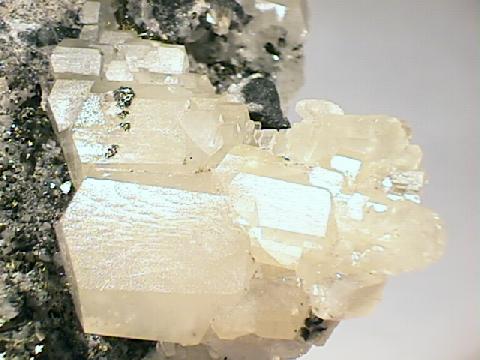

clp-18 ($ 32.00)
Amax Mine, Reynolds County, Missouri, U.S.A.
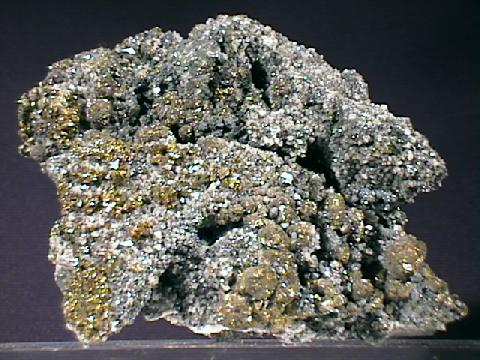
CHALCOPYRITE specimen clp-19
$ 25.00
$ 25.00
Dims: 4.3 x 2.9 x 2.5" (10.9 x 7.5 x 6.3 cm)
Wt: 1 lb., 1.9 oz. (508 g)
Amax Mine, Reynolds County, Missouri, U.S.A.
Several dozen Chalcopyrite crystals rest on the gray limestone host rock of this specimen. These crystals are tiny, not exceeding 0.1" (3 mm) in diameter, and are in very good condition. Though they likely occur in the standard tetragonal disphenoidal form, this is difficult to determine because of their heavy intergrowth with each other. They do show well-defined edges and generally clean faces, however. Their deep golden color and metallic luster are standard for their species. They are accompanied by several botryoidal marcasite or pyrite formations, hundreds of tiny, white dolomites, and several very tiny but well-formed galena cubes.
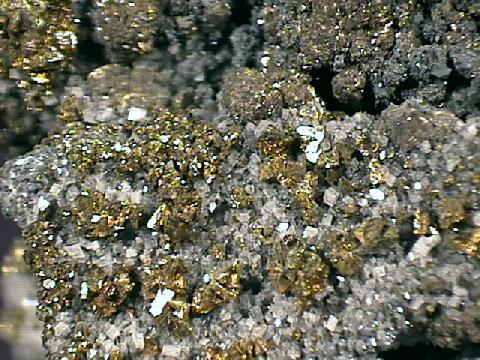

clp-19 ($ 25.00)
Amax Mine, Reynolds County, Missouri, U.S.A.
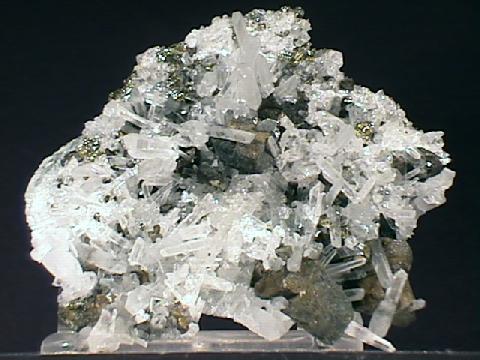
CHALCOPYRITE specimen clp-20
$ 26.00
$ 26.00
Dims: 2.6 x 2.2 x 1.2" (6.7 x 5.5 x 3.0 cm)
Wt: 2.45 oz. (69.7 g)
Huaron Mine, Ancash Department, Peru
Several small clusters of rather heavily-intergrown Chalcopyrites rest on the quartz base of this hand specimen. The Chalcopyrites appear to reach 0.4" (1 cm) in diameter and are in moderately good condition- there are many bits of broken crystals at the edges of the base, but those that are intact are generally in excellent condition. Their tetragonal forms are quite warped, as I believe that each cluster consists of two or more crystals that are either heavily intergrown or have formed interpenetration twins. All appear to be coated with another mineral, giving them a dull brown color and a dull, silky luster- however, the broken crystals show the standard deep golden color and metallic luster. They rest among many small, thin quartz crystals that extend upwards from the quartz base.

clp-20 ($ 26.00)
Huaron Mine, Ancash Department, Peru
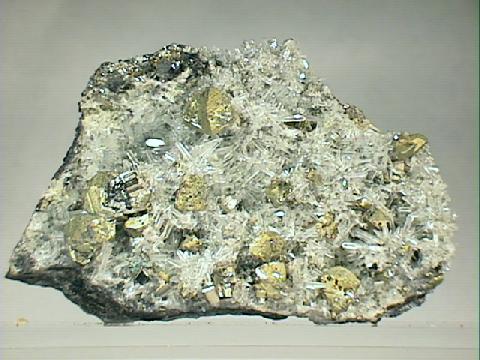
CHALCOPYRITE specimen clp-21
$ 80.00
$ 80.00
Dims: 3.2 x 2.3 x 1.5" (8.1 x 5.8 x 3.8 cm)
Wt: 8.92 oz. (233.1 g)
Huaron Mine, Ancash Department, Peru
At least 15 Chalcopyrite crystals are scattered on the quartz-and-sulfide base of this large hand specimen. The largest crystals reach nearly 0.4" (1.0 cm) in diameter, and all are in good condition. Their sphenoidal form is good, and most appear to be twinned or intergrown. All have the standard deep golden color and slightly dull metallic luster of their species, though one or two show a hint of blue iridescence. Most of these Chalcopyrites appear to cover small pyrite cubes, and one such cube appears to be "plated" with a very thin layer of Chalcopyrite! They rest amidst a druse of small quartz needles that coat a base made primarily of sphalerite.

clp-21 ($ 80.00)
Huaron Mine, Ancash Department, Peru
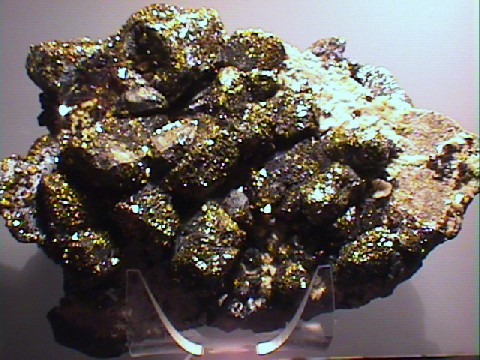
CHALCOPYRITE specimen clp-22
$ 189.00
$ 189.00
Dims: 7.0x4.8x2.4" (17.7x12.2x6.2 cm)
Wt: about 3 lb 10 oz. (1.64kg)
Tea River, Oklahoma, USA
This cabinet specimen started as a shelf of intergrown dolomite crytals, upon which grew many large sphalerite crystals, which in turn became coated with thousands of small golden tetrahedral chalcopyrite crystals. These crystals have excellent form and tended to grow with similar crystal alignments (at least those on the same large sphalerite crystal). This results in an interesting appearance where from each viewing angle, one or more chalcopyrite covered sphalerites will reflect golden light from its entire surface. The largest of the chalcopyrites measures about 5mm on a side.
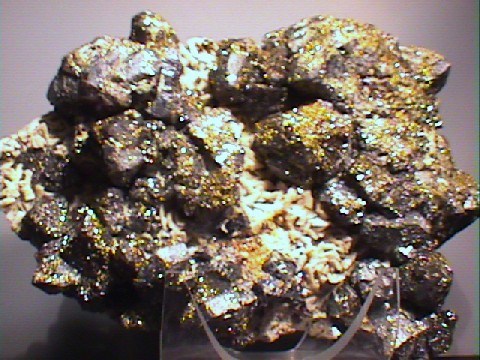

clp-22 ($189.00)
Tea River, Oklahoma, USA
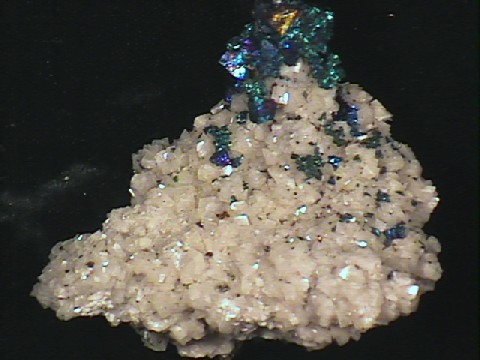
CHALCOPYRITE specimen clp-23
$ 60.00
$ 60.00
Dims: 2.4x1.9x1.5" (6.1x4.9x3.7cm)
Wt: 2.94 oz. (83.2g)
Sweetwater Mine, Renolds Co., Missouri, USA
Perched on the tip of a cluster of dolomite crystals are scores of brightly colored chalcopyrite crystals, plus a scattering of golden pyrite crystals. The result is a very cute specimen, as the largest ond most brightly colored crystals are nicely presented at the top of the specimen. The chalcopyrite has typical colors of blue, purple, and green. The crystals are complex, although there are some well-formed tetrahedrons present.
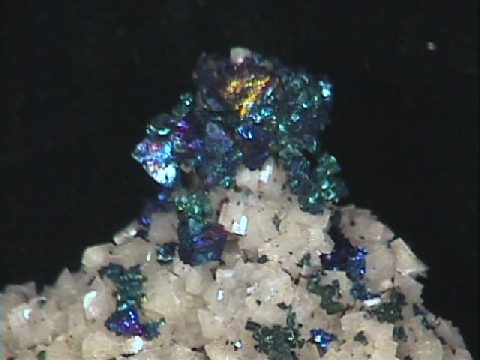

clp-23 ($ 60.00)
Sweetwater Mine, Renolds Co., Missouri, USA
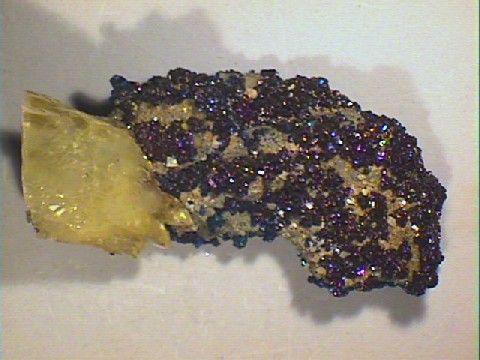
$ 125.00
Dims: 2.4x5.1x2.7" (6.2x13.0x7.0cm)
Wt: 13.69 oz. (387.3g)
Sweetwater Mine, Renolds Co., Missouri, USA
This specimen presents as a gray stone mounted upon a calcite crystal, nearly covered in chalcopyrite crystals. The main features are the calcite and brightly colored blue and purple chalcopyrite, although there is also a scattering of golden pyrite and white dolomite crystals. The specimen nearly stands on its own - I am sure that the cleaved "bottom" of the calcite could be improved to make a free-standing specimen, although a small felt pad will do the trick. The chalcopyrite crystals are small but nice, and it is the overall presentation that makes this specimen "special".
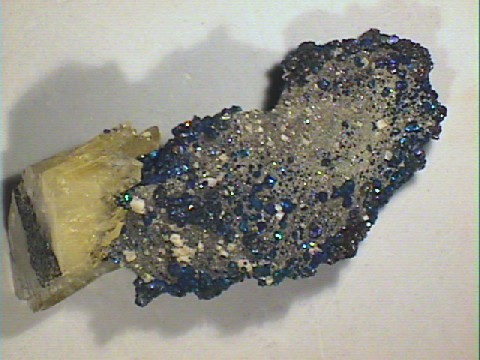

Sweetwater Mine, Renolds Co., Missouri, USA
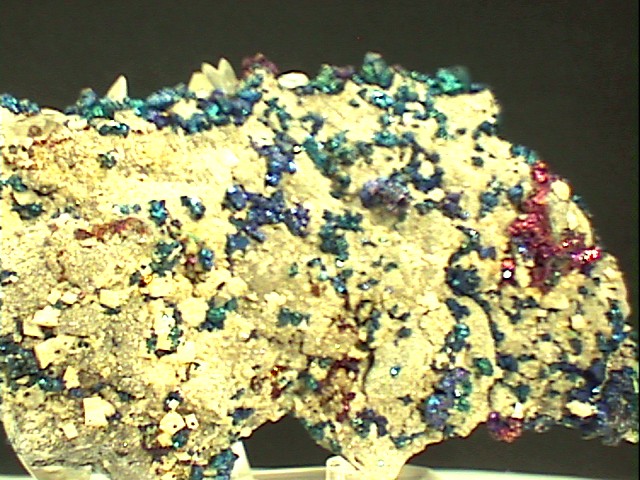
CHALCOPYRITE specimen clp-27
$ 60.00
$ 60.00
Dims: 5.53x3.10x1.47" (14.04x7.88x3.73cm)
Wt: 16.19oz (459g)
Sweetwater Mine West, Rynolds County, Missouri, USA
Hundreds of chalcopyrite crystals are scattered over this specimen. They all are brightly colored in irridescent hues of blues and purples, with some areas showing greens, yellows, or oranges. There is a tiny bit of brassy colored pyrite present, and one side of the specimen has many tiny crystals that look like dolomite, while the other side of the specimen has numerous, large and transparent slightly yellow-gray rhombohedral calcite crystals. The color of the host rock is wrong in the picture - it is really gray, not yellow, but the blues and reds of the chalcopyrite are correct.
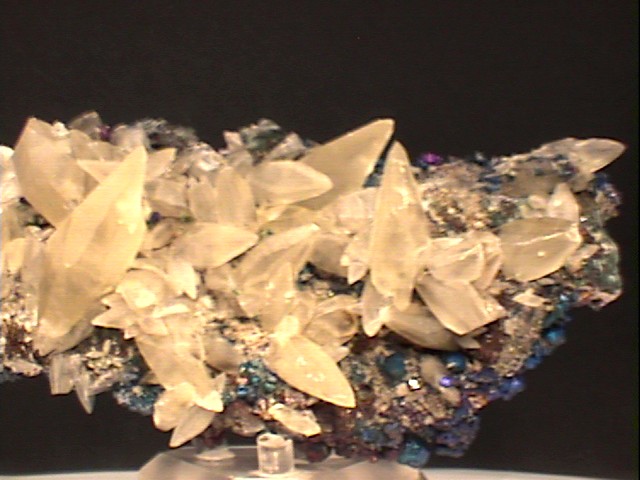

clp-27 ($ 60.00)
Sweetwater Mine West, Rynolds County, Missouri, USA
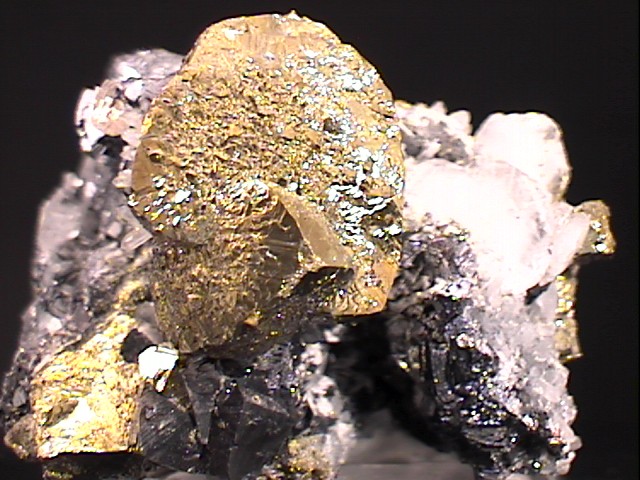
CHALCOPYRITE specimen clp-25
$ 25.00
$ 25.00
Dims: 1.61x1.51x1.19" (4.09x3.84x3.02cm)
Wt: 3.04oz (86.3g)
Dalnegorsk, Russia
This specimen consists of an assemblage of several metal sulfides and quartz crystals, and it is dominated by a cluster of at least two tightly intergrown chalcopyrite crystals, perched neatly upon the top of the specimen. The chalcopyrite has a brassy color, and an interesting growth pattern of many crystal faces best viewed with a loupe. Much of the rest of the specimen is galena, including a single perfect crystal tucked away in a cavity in that large chalcopyrite.
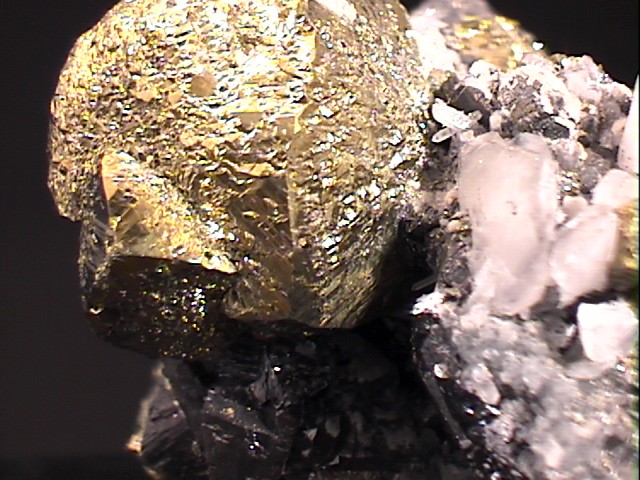

clp-25 ($ 25.00)
Dalnegorsk, Russia
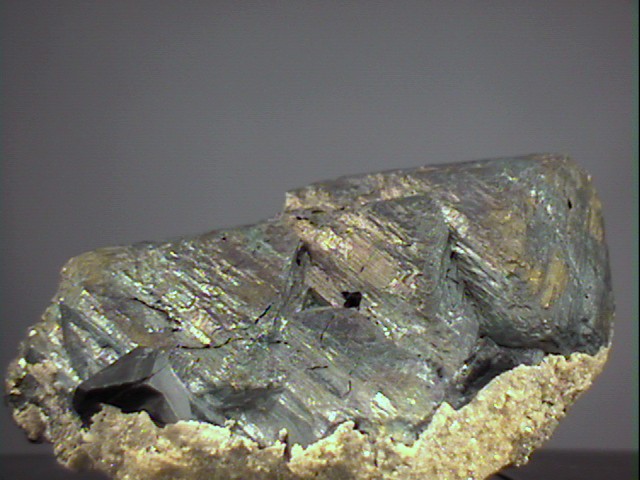
CHALCOPYRITE specimen clp-26
$ 52.00
$ 52.00
Dims: 2.51x1.99x1.28" (6.38x5.06x3.24cm)
Wt: 7.00oz (198.4g)
Dalnegorsk, Russia
This is an interesting specimen of chalcopyrite, and is comprised of a cluster of disphenoid crystals (like two opposing wedges, resembling a tetrahedron). All of the crystals have a steped growth pattern of equilateral triangles, and all have multiple irridecent colors dominated by blues but including purples and yellows. Also present are several fragments of opaque black crystals that look like schorl tourmaline but are more likely sphalerite, plus a crust that looks like tiny calcite crystals.
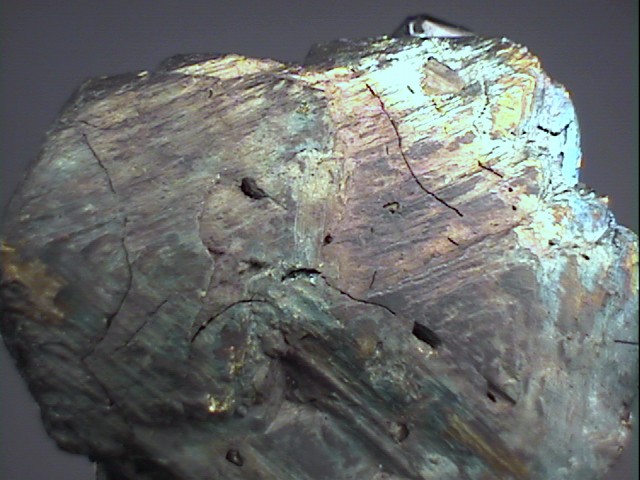

clp-26 ($ 52.00)
Dalnegorsk, Russia

CHALCOPYRITE specimen clp-28
$ 45.00
$ 45.00
Dims: 4.11x3.37x1.25" (10.44x8.55x3.17cm)
Wt: 12.20oz (346g)
Sweetwater Mine West, Reynolds County, Missouri, USA
THis specimen has perhaps a hundred mostly isolated chalcopyrite crystals scattered over its surface. They are all deeply colored in blues, greens, golds, purples, even reds. One side of the specimen is nearly covered with rhombohedral crystals of calcite. The other side has more minerals present, but I cannot identify them, even with the aid of my loupe.


clp-28 ($ 45.00)
Sweetwater Mine West, Reynolds County, Missouri, USA

CHALCOPYRITE specimen clp-29
$ 60.00
$ 60.00
Dims: 2.27x1.40x1.39in (5.77x3.56x3.52cm)
Wt: 3.34oz (94.6g)
Sweetwater Mine West, Reynolds County, Missouri, USA
Dozens of chalcopyrite crystals are scattered in clusters over the surface of a host calcite cluster. The chalcopyrite has many shapes including some excellent but small crystals, and most have a purple irridescence, although other colors are also present.


clp-29 ($ 60.00)
Sweetwater Mine West, Reynolds County, Missouri, USA